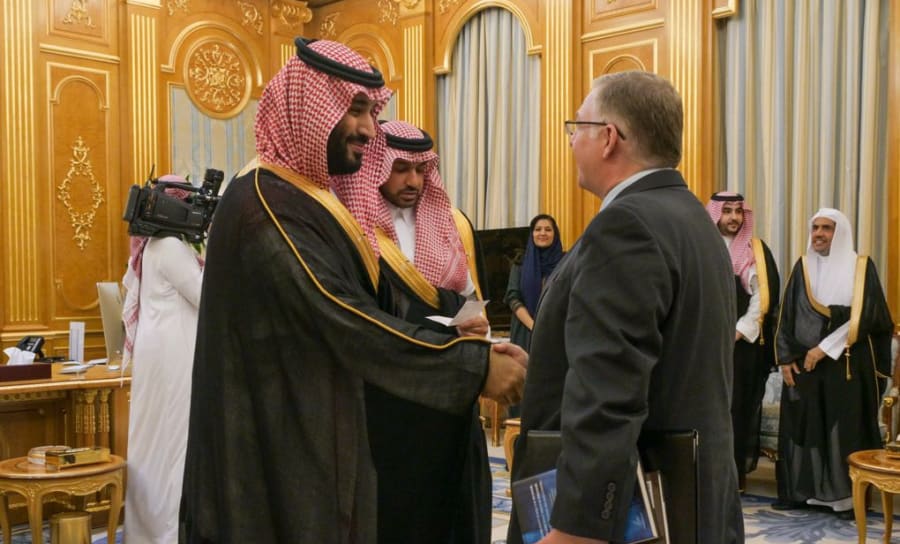Ben Shapiro praises ‘Enemies and Allies’ as ‘only book that actually includes extensive, on-the-record interviews’ with top Arab and Israeli leaders about Iran threat, massive change underway in Middle East
“Go pick up a copy of the book today!” Shapiro tells his audience during interview with Rosenberg

On the eve of the 20th anniversary of 9/11, Ben Shapiro – the enormously popular radio host and podcaster – interviewed Joel C. Rosenberg about his new book and about what Rosenberg calls America’s current crisis of leadership.
“This is the grave problem – and I say this in ‘Enemies and Allies’ – to misunderstand the nature and threat of evil is to risk being blindsided by it,” Rosenberg warned. “President [Joe] Biden fundamentally does not understand who our enemy is. …Ignorance of the enemy, matched with incompetence, matched with hubris is an extremely dangerous combination for an American commander-in-chief.”
In the wide-ranging interview about regional politics in the Middle East and Rosenberg’s new nonfiction book, “Enemies and Allies: An Unforgettable Journey inside the Fast-Moving and Immensely Turbulent Modern Middle East,” Rosenberg said that having an American president who is tougher on the American people than on Iran “is not going to bode well for our future.”
“God forbid that we get blindsided by a nuclear 9/11 by a team who is more determined to force us to wear masks and get vaccinated – unconstitutionally,” Rosenberg said of Biden’s eagerness to get back into the nuclear deal with Iran. “He’s tougher on the American people than he is on Iran. What is wrong with that picture?”
Rosenberg insisted that “leadership matters” especially when it comes to how the United States deals with key allies such as Saudi Arabia.
“President [Donald] Trump, admittedly, had no foreign policy experience. I was a ‘Never Trumper’ in 2016. But when I sat with him in the Oval Office to discuss these issues, I said, 'Mr. President, I was wrong. I don’t agree with you on everything. I don’t agree with everything, how you say it. But you have shown strength. You destroyed the caliphate. You took out Qassem Soleimani. You’ve liberated 5 million people from the ISIS caliphate. You ripped up the Iran nuclear deal. You moved the U.S. embassy to Jerusalem. You are showing strength, and our enemies now fear us and our allies trust us,’” Rosenberg recounted. “But President Biden – with 50 years of experience – he’s destroying all those gains.”
And now, following Biden’s disastrous handling of America’s withdrawal from Afghanistan, Rosenberg said, a “great darkness is emerging.”
“President Biden has just emboldened our enemies and rattled our allies,” he said.
“The question is: If President Biden can’t deal with the Taliban, how is he going to protect us and our allies from Tehran?”
Here is a transcript of the entire conversation:
BEN SHAPIRO: Welcome to the Ben Shapiro Show. So, joining us on the line is Joel Rosenberg. He’s a New York Times best-selling author of 15 novels and five nonfiction books , with nearly five million copies sold. He’s also the founder and editor of ALL ISRAEL NEWS and ALL ARAB NEWS. And he has a brand new book out titled, “Enemies and Allies: An Unforgettable Journey Inside the Fast-Moving and Immensely Turbulent Modern Middle East.”
As we approach Sept. 11, it is a good time to remember that the Middle East has been transformed in a wide variety of ways over the past 20 years, but particularly over the last five or six.
Joel, thanks so much for joining me. I really appreciate it.
ROSENBERG: It’s great to be with you, Ben. Thank you.
BEN SHAPIRO: So, let's talk about your new book. This is the only book that actually includes extensive, on-the-record interviews with people ranging from Benjamin Netanyahu to Mohammed bin Salman, who's the crown prince of Saudi Arabia, to [President Abdel Fattah] el-Sisi in Egypt.
Why don’t you talk a little bit about the kind of New Middle East, because I think that there's the picture of the Middle East that people still have in their heads, in which the key issue in the Middle East remains Jews versus Arabs or Jews versus the Muslims. And in your book, you really talk about how that's no longer the case.
ROSENBERG: Yeah, Ben, it’s a tectonic shift that’s going on in the Middle East. And understandably, a lot of Americans have been focused internally for the last 18 months, and, you know, for good reasons. But there is a sea change going on in Arab attitudes, changing toward – not only on “the street,” but also at the leadership level. And they’re asking themselves:
“Who is my friend and who is my foe?”
“Who is my enemy and who is my ally?”
And of course, as you know, Ben — I don't have to tell you — for the last hundred years the Jews, the Christians, Zionists were all the enemies, right? But there’s a change. And as you say, this is the first book [in which the author] goes in and and sits down for hours and hours and hours with almost all of the top leaders in the Arab world, as well as Prime Minister Netanyahu and Israeli President Reuven Rivlin, and the others.
Why? Why are they changing? What is happening? Why do they want to make peace with Israel? Why have we had four Arab-Israeli peace treaties – the Abraham Accords – just last year from President [Donald] Trump, who was a novice in foreign policy and yet made huge breakthroughs?
And this book puts this stuff on the record, and it’s super-encouraging. But I'll say, at the same time, great darkness is emerging as well, and President Biden has just emboldened our enemies and rattled our allies.
BEN SHAPIRO: So, let’s talk about that because we are now approaching the 20th anniversary of Sept. 11. And on the 20th anniversary, the Taliban has now taken back Afghanistan at the behest of the Biden administration, which refuses to speak strong words about an actual terrorist government.
Meanwhile, Americans are still stuck behind enemy lines over there, and armaments that are American in origin are now being shipped, shipped over to Iran.
Meanwhile, the Biden administration is attempting new overtures to Iran.
So, all of the progress in the Middle East, how quickly can this be undone? What is the likely effect of all this going to be?
ROSENBERG: Well, as I say, Ben, in “Enemies and Allies,” you’re watching two completely competing narratives and dynamics.
Iran is now just two months away, according to Israeli intelligence, two months away from having enough enriched uranium to start building nuclear weapons, if they so choose. Now, it would probably take some more time to actually fashion those into the types of bombs that could be attached to missiles. But we’re way past the red lines that Netanyahu set.
So, according to the Iranian regime, they believe the wind is at their back. Allah is on their side. And they’re ascendant. And everybody in the region fears that they might be right.
And what President Biden has just done is pulled the Jenga stick out, collapsing Afghanistan.
Now, losing Afghanistan is bad after $2 trillion dollars, 2,500 [U.S. soldier deaths], and 20 years. It's horrifying, but it’s not our main strategic threat.
The question is: “If President Biden can’t deal with the Taliban, how is he going to protect us and our allies from Tehran?”
And this is the grave problem – and I say this in “Enemies and Allies” – to misunderstand the nature and threat of evil is to risk being blindsided by it. President Biden fundamentally does not understand who our enemy is. But for 50 years in foreign policy, he thinks he does.
So, ignorance of the enemy, matched with incompetence, matched with hubris is an extremely dangerous combination for an American commander-in-chief.
BEN SHAPIRO: So, one of the things that you talk about in “Enemies and Allies,” and that is somewhat heartening, is that despite Biden’s best efforts to shake up the box in the Middle East, the box has already been shaken and the pieces already in place with regards to some of these alliances.
So, I was mostly fascinated with the interview that you did with Mohammed bin Salman, who is this sort of shadowy figure that most Americans don’t really know about because the government of Saudi Arabia is confusing to most people, since it is in fact a dictatorship.
But the Crown Prince, Mohammed bin Salman, has been making some really interesting moves over there. The media, meanwhile, have been treating him as a pariah because of the Khashoggi murder, which admittedly was horrifying.
ROSENBERG: Horrifying.
BEN SHAPIRO: What has changed in Saudi Arabia? What are the future prospects for Saudi Arabia in terms of moderation, in terms of peace with Israel? And what was Mohammed bin Salman's response to the fact that the Khashoggi murder really changed perceptions of him that were becoming more warm, I think, before this turn?
ROSENBERG: Right. Well, let me break that into two pieces, Ben.
First, you mentioned “pariah state.” That’s the language that President Biden is actually using. He just canceled Defense Secretary Lloyd Austin's trip to Riyadh. He’s sort of put MBS and the Saudis in a box, doesn't really want to deal with them.
But President Biden is dealing with Iran, trying to negotiate a deal, trying to give hundreds of billions of dollars again to Iran, even though their new president is under U.S. sanctions for having murdered 30,000 Iranian people. Ok, so what the hell is going on in that White House, right? How do you how do you reconcile throwing an ally under the bus now and you're dealing with the enemy? So that's the first thing.
The second thing is, listen, the Khashoggi murder was horrific, unacceptable, sickening at every possible level. However, at the moment, and I document this clearly in the book, there is no there is no clear proof that MBS ordered that hit.
The evidence suggests that he told his team, “Take care of it.” Now, maybe he meant “kill him.” But maybe he meant go take care of this thing, like, “bring him back and let's talk to him and put him in prison or whatever.”
I'm not trying to defend this, but I'm saying is even the document that the Biden administration put out from the director of National Intelligence a few months ago – a 4-page document – it accuses MBS of being the murderer. But it lists 26 people that were sent on this team. And it says in the document, “We can't determine as American intelligence whether these people knew that their actions would lead to the death of Khashoggi.”
Whoa, whoa, whoa, wait a minute. To accuse an American ally of cold-blooded murder when you can't say the people who were sent there knew they were murdering? That doesn't make sense. So we've got a problem there and we have to deal with it.
The other side is this: Remember 20 years ago, Ben, 15 of the 19 hijackers were Saudi. Osama bin Laden was a Saudi, right?
[Since then,] there's been a game-changing season of reform.
MBS told me personally — and on the record, it’s in “Enemies and Allies” – we asked him, “Where were you on 9/11? What do you remember?”
He said, “I was 16 years old. My father was the governor of Riyadh. My mother saw this on the TV. She told me to come running.” And he said he watched the second plane go into the towers. He said at that moment, he feared that Islam would be forever branded as terrorists. And he got angry, and he and his cousins in the days and weeks that followed decided we're going to grow up and – this is his language, not mine, I'm an Evangelical, but I'll just say – he said, “We’re going to kick the asses of the people that do this.”
And that’s what they’re doing.
MBS has fired 3,000 extremist clerics from the mosques. He is changing the textbooks that preached hatred against Jews, against Christians and Westerners. He is fighting radical Islamists on the battlefield in Yemen. Messy? Yes. But doing it because it’s right? Yes. The Houthis, armed by the Iranians, are firing hundreds of missiles into Saudi Arabia.
Suddenly, Saudi Arabia starts thinking, “We're a lot like Israel. We're targeted. We got missiles [fired at us]. Nobody defends us. Nobody thinks we're doing the right thing to be [engaged in] self-defense.”
And – I'll just give you one other, but there are many, many examples in the book; but again, this was on the record. There’s not a single other book that has MBS on the record.
MBS told us that he regards the Supreme Leader of Iran as “the new Hitler.”
So the way he and his colleagues in the Arab world – and Israeli Prime Minister Netanyahu, and the new Israeli prime minister – the way they see it is this: they fear a nuclear 9/11.
A second Holocaust.
By a regime in Iran that the Biden administration is trying to appease, rather than stand with our allies against our worst enemy.
BEN SHAPIRO: Well, the book once again is, “Enemies and Allies: An Unforgettable Journey Inside the Fast-Moving & Immensely Turbulent Modern Middle East.”
So, Joel, final takeaway. You know, obviously, as we approach the 20th anniversary of 9/11, it seems that the American people have largely forgotten 9/11. It seems like something very far back in the rearview mirror. People don't think about these regions of the world anymore. When they do, they basically want to withdraw. And then only when bad circumstances follow did they seem to care at all. We've now repeated this pattern in Iraq. We’ve repeated this pattern in Syria. We’ve repeated this pattern in Afghanistan now, as well. What should Americans think about on 9/11 moving forward?
ROSENBERG: Well, I think that mostly Americans should never forget. Never forget the 3,000 innocent people who lost their lives, and of course, all the brave first responders.
There’s a story this morning of an Israeli Special Forces veteran who was sitting in seat 9B and actually attacked the terrorists in motion, but they slit his throat. He almost prevented part of 9/11 from happening.
We can’t forget heroes. We can't allow another Pearl Harbor or 9/11 to happen because we didn’t understand our enemy.
“Enemies and Allies” is about understanding who we are, and who our enemy is.
And I got to say that leadership matters.
President Trump, admittedly, had no foreign policy experience. I was a “Never Trumper” in 2016. But when I sat with him in the Oval Office to discuss these issues, I said, “Mr. President, I was wrong. I don’t agree with you on everything. I don’t agree with everything, how you say it. But you have shown strength. You destroyed the caliphate. You took out Qassem Soleimani. You’ve liberated 5 million people from the ISIS caliphate. You ripped up the Iran nuclear deal. You moved the U.S. embassy to Jerusalem. You are showing strength, and our enemies now fear us and our allies trust us.”
But President Biden, with 50 years of experience, and he’s destroying all those gains.
And this is the key. The key is not experience. I would have said it was — but it’s wisdom, its judgment, it’s the type of team you put around us.
God forbid that we get blindsided by a nuclear 9/11 by a team who is more determined to force us to wear masks and get vaccinated – unconstitutionally – then dealing….he’s tougher on the American people than he is on Iran. What is wrong with that picture? It is not going to bode well for our future.
We’ve got to pray that this guy changes course, or is removed.
BEN SHAPIRO: That is Joel Rosenberg. His book, “Enemies and Allies.” Joel, I appreciate the time. Go pick up a copy of the book today!
ROSENBERG: Thank you, Ben.

The All Israel News Staff is a team of journalists in Israel.














